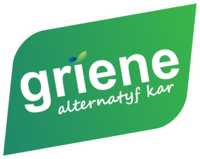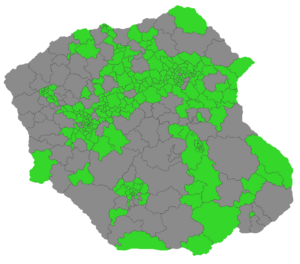Green - Alternative Choice
This article is incomplete because it is pending further input from participants, or it is a work-in-progress by one author. Please comment on this article's talk page to share your input, comments and questions. Note: To contribute to this article, you may need to seek help from the author(s) of this page. |
Green - Alternative Choice Grien - Alternatyf kar Grün - Alternative Wahl Grėn - Unġeliccyst Roheline – alternatiivne valik | |
|---|---|
 | |
| Leader | Sjearp Groeneveld |
| Founded | 9 April 1984 (As the Rainbow Movement) |
| Headquarters | Yndyk |
| Youth wing | Jonge Groenen |
| Membership (2021) | 22,209 |
| Ideology | Green politics Localism Pro-Eucleanism |
| Political position | Centre-left |
| Euclean Parliament group | Green and Ecologist Movement |
| Colours | Green |
| Slogan | "Better Environment, Better Tomorrow." |
| Folkssenaat | 6 / 201
|
| Federal Council | 0 / 96
|
| Euclean Parliament | 2 / 24
|
| Website | |
| www.degrienen.as | |
Green - Alternative Choice (Dellish: Grien - Alternatyf kar, G-AK, Weranian: Grün - Alternative Wahl, G-AW, Swathish: Grėn - Unġeliccyst, G-UC, Kirenian: Roheline – alternatiivne valik, R-AV) is a green political party in Alsland. It was founded in 1984 by environmentalists and anti-nuclear activists. Having historically been a minor party which was only represented in certain Municipalities.
The party won a seat in Yndyk in the 1986 legislative election. The party later won 2 seats in the Senate in the 1994 legislative election. The party held onto it's 2 seats despite a fall in it's vote share at the 1998 legislative election. The first major breakthrough for the party came in 2007 when it came first in municipal elections, marking the first time the party had won a federal election. The party joined Liekele Ykema's cabinet in 2010 and expanded it's number of seats from 4 to 9 at the 2018 legislative election. In 2020 the party came close to winning that year's Presidential elections under it's leader Sjearp Groeneveld. In 2021 it merged with the localist Community 2000 party to form a united ecologist front for the 2022 Alslandic legislative election.
It currently holds 10 seats in the Folkssenaat and 2 in the Euclean Parliament.
History
1984—1994; founding and initial successes
The party was first founded by anti-nuclear activists in Penzmölsen who were against the construction of the Penzmölsen nuclear power plant in 1984, it was initially founded as the Rainbow Movement (Weranian: Regenbogenbewegung). It's first major success happened one year after it's founding in 1985 when the movement won 18 out of the 25 seats on the Penzmölsen municipal council, despite this the construction of the plant went ahead against the wishes of the local population. At a party meeting in 1986 it was agreed the party should reform into a nationwide anti-nuclear environmentalist movement and the party was officially registered as the Green-Rainbow Alliance, shortly afterwards it would merge with the Alternative Choice party to form the Green - Alternative Choice joint list for the 1986 legislative election.
The party won a seat in Yndyk during the election and Jenskje Ferwerda became the party's leader. Spurred by it's election victory and public opposition to a third nuclear power plant — planned to be constructed in Lower Delland — the Greens launched a series of demonstrations outside the Senate building and Offices of the Premier and Department of Agriculture and the Environment which would eventually contribute to the government scrapping plans for any more nuclear power plants in Alsland. Ferwerda lost her seat at the 1990 legislative election although she was re-elected in the 1994 legislative election. She was joined in the Senate by Rink de Wit who won a seat in Lower Delland.
De Wit was expelled from the party whilst pending a police investigation after he was arrested for speeding, after the investigation found De Wit guilty and he was fined and then later resigned from the Senate and was replaced by municipal councillor Sapke Meyer who joined Ferwerda.
1994—2006; Ferwerda and Meyer's leadership
At a party conference in 1996, Meyer and Ferwerda became co-leaders of the party which had grown rapidly in membership as a result of the emergence of third-wave feminism in Alsland. To try and position the party as the champion of Feminist ideals it officially adopted feminist policies and slogans. Later that year the party became the first party in Alsland to call for total equality for the LGBT community. The party's stance was seen as radical in the Senate which was dominated by the conservative Humanist Sotirian Union and National Bloc parties, even the centre-left Workers' Party did not have an official policy on LGBT rights.
The party had a disappointing result in the 1997 municipal elections when it lost half of it's municipal councillors and lost it's absolute majority on the Penzmölsen municipal council which it had dominated since 1985. The defeat caused a split in the party with some of the remaining municipal councillors founding the localist Community 2000 party as they felt Ferwerda and Meyer had shifted the party towards the left and away from it's original goals, they were joined by the party's original founders including Swen Schock and Sybille Faehrmann. The party's decline continued until 2002 when Meyer lost her seat in the Senate and the party won less than 1% of the vote and was overtaken by Community 2000 who failed to win a seat. Meyer resigned as co-leader but was reappointed by party members who were supportive of Ferwerda and Meyer.
In response to their series of defeats the party adopted a new set of policies including environmentalist policies and policies focusing on local issues. The party was accused of becoming Nimbyist by other environmentalists although Meyer and Ferwerda denied this by claiming they support local residents having the final decision on whether to build infrastructure projects in their local area whilst claiming they support constructing new housing. The party recovered from it's defeats in 2006 when it won 3 seats in the Senate, Meyer having been re-elected and Vinzenz Ungers being elected in Garz. After the election Ferwerda decided to stand down as the party's co-leader and Ungers was elected unanimously to replace her as co-leader.
2007—2018; Dominance in local politics
Ahead of the 2007 local elections, the party ran a grassroots campaign promising local residents the final say on local issues. Helped by divisions in the major parties and a major split occurring in the Alslandic left-wing parties with the emergence of the Progressive Alliance, the party grew rapidly in membership and several high-profile municipal defections helped the party's public profile. The decision to create shortlists featuring only residents from their respective municipalities also helped the party's claim to represent local issues. In the election the party ended up becoming the largest group in 152 municipal councils and was by far the largest party in local politics, the result was unexpected with even the most optimistic projections showing the party trailing the National Bloc, however the party won over 30% of the vote compared to the National Bloc's 14%.
Opinion polls after the election showed the Greens surging into first place if an election was to be held with one poll suggesting the party could win upwards of 70 seats in the Senate.
To keep their dominance in municipal politics the party adopted a zero-tolerance policy for illegal activities which had plagued local politics for years previously and cracked down on corruption in municipal authorities. Due to the party's position on municipal councils, proposed municipal reforms which were a key platform of the governing Alslandic Section of the Workers' International had to be put on hold and were eventually discarded due to fervent opposition from the Greens and voters.
The party's victories in local politics ultimately failed to translate to federal politics where the party won only 4 seats at the 2010 legislative election, however the party became necessary for Liekele Ykema's government to have a majority in the Senate and the Greens joined the governing coalition in 2010. Björn Auer from the Greens became the Secretary of the Environment and new Departments for Conservation and Climate Cooperation were founded and also led by Ungers and Meyer respectively. Auer developed a high profile picture within the cabinet after a personal dispute between himself and Ykema that caused the coalition to come close to breaking up. Some of the Greens policies such as net-zero by 2045 were passed by the government. The party was also allowed to abstain whilst voting on tuition fees because of Alsland's negative parliamentarism. Meyer and Ungers both stood down as co-leaders of the party in 2013 and the leader of the Rahu-Central municipal council Aadu Kotka became the sole leader of the party. In 2014 Meyer did not stand for re-election and the party lost her seat in the election, however with the election of Sjearp Groeneveld in Wottested the party kept it's 4 seats in the Folkssenaat.
In 2017 Auer suddenly died from a heart attack on stage during the party's annual conference. Groeneveld was appointed as the new Secretary of the Environment to replace Auer. Under the leadership of Kotka, the party expanded it's representation in the Senate from 4 seats to 9 at the 2018 legislative election and won over 10% of the vote. The party remained in coalition under Hepke Veltman and Ottila Möller.
2018—Present; Reunification and Groeneveld's leadership

At the 2019 Euclean Parliament election, the party won 2 seats in the Euclean Parliament and came close to winning a third seat. Their successful campaign had been led by Groeneveld who developed an increasingly high public profile and had the highest approval rating of any cabinet member in Veltman's government. Groeneveld announced his candidacy for the 2020 Presidential election. He led the first round where he won 30% of first round votes and he was the favourite to win until a controversy regarding his Hennish citizenship and thus his eligibility for the Presidency caused Hepke Veltman to narrowly win.
Despite losing narrowly to Veltman, the Greens surged in opinion polls after the election and Groeneveld has been consistently the most popular candidate for Premier ahead of the 2022 Alslandic legislative election. In 2021, Kotka resigned as leader to make way for Groeneveld to become leader of the party. Shortly afterwards the party reunified with Community 2000 which had been decimated in previous local elections by the Greens, the inclusion of Community 2000's 1 senator in the Folkssenaat gave the Greens 10 Senators in the chamber.

